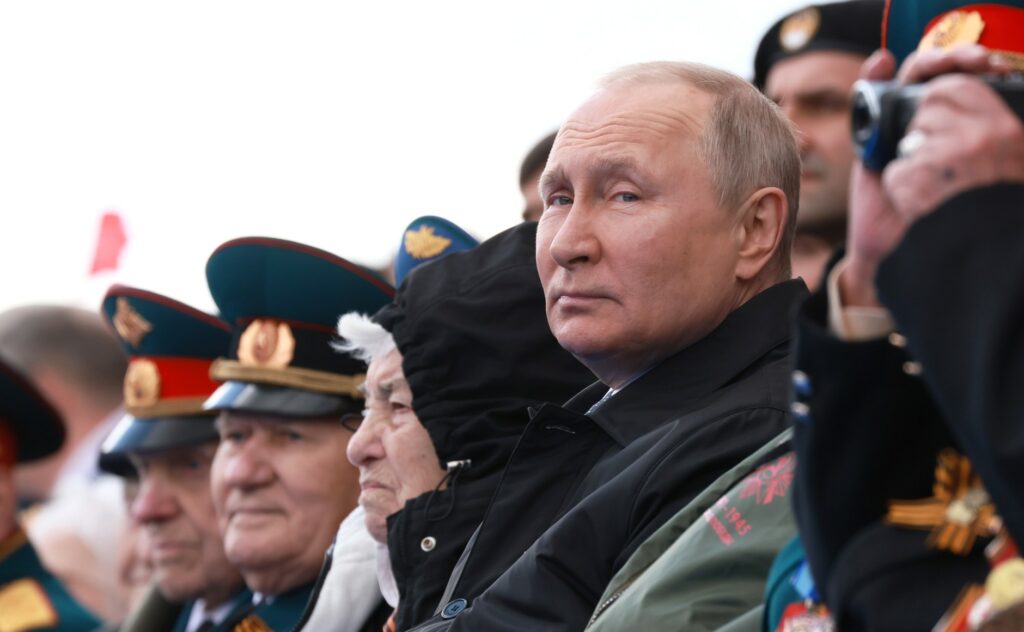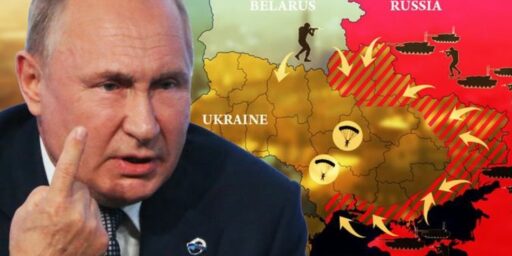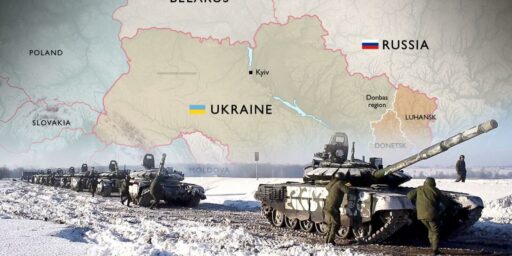Putin Escalates War Abroad While Purging Enemies at Home
The Russian autocrat is emboldened.

Max Hunder and Vitalii Hnidyi reporting for Reuters (“Russian attack on Ukraine’s Kharkiv kills 14, injures dozens“):
A Russian strike on a crowded DIY hardware store in Kharkiv killed 14 people and wounded dozens more, Ukrainian officials said on Sunday morning, the death toll rising as the country’s second-largest city reeled from two attacks a day earlier.
Two guided bombs hit the Epicentr DIY hypermarket in a residential area of the city on Saturday afternoon, Regional Governor Oleh Syniehubov said on national television.
The strikes caused a massive fire which sent a column of thick, black smoke billowing hundreds of metres into the air.
Forty-three people were injured, the local prosecutors’ office said, adding that ten of the twelve dead had still not been identified.
Kharkiv Mayor Ihor Terekhov said about 120 people had been in the hardware store when the bombs struck.
“The attack targeted the shopping centre, where there were many people – this is clearly terrorism,” Terekhov said.
In a post on the Telegram app, Ukraine’s Interior Minister Ihor Klymenko said 16 people were still missing after the strike.
The past week has seen an uptick in strikes on the city after Russian troops stormed across the border, opening a new front north of the city.
Russia has bombarded Kharkiv, which lies less than 30 kilometres (20 miles) from its border, throughout the war, having reached its outskirts in a failed bid to capture it in 2022.
President Volodymyr Zelenskiy issued a plea to Ukraine’s Western allies to help boost air defences to keep the country’s cities safe. French President Emmanuel Macron, writing on social media platform X, denounced the attack on the store as “unacceptable.”
The top of NYT website has three Russia-related stories this morning.
Paul Sonne and Anatoly Kurmanaev, reporting from Berlin (“Optimistic About the War in Ukraine, Putin Unleashes a Purge at Home“):
Periodic outcries over incompetence and corruption at the top of the Russian military have dogged President Vladimir V. Putin’s war effort since the start of his invasion of Ukraine in early 2022.
When his forces faltered around the Ukrainian capital, Kyiv, the need for change was laid bare. When they were routed months later outside the city of Kharkiv, expectations of a shake-up grew. And after the mercenary leader Yevgeny V. Prigozhin marched his men toward Moscow, complaining of deep rot and ineptitude at the top of the Russian force, Mr. Putin seemed obliged to respond.
But, at each turn, the Russian president avoided any major public moves that could have been seen as validating the criticism, keeping his defense minister and top general in place through the firestorm while shuffling battlefield commanders and making other moves lower on the chain.
Now, with the battlefield crises seemingly behind him and Mr. Prigozhin dead, the Russian leader has decided to act, changing defense ministers for the first time in more than a decade and allowing a number of corruption arrests among top ministry officials.
The moves have ushered in the biggest overhaul at the Russian Defense Ministry since the invasion began and have confirmed Mr. Putin’s preference for avoiding big, responsive changes in the heat of a crisis and instead acting at a less conspicuous time of his own choosing.
[…]
“They likely judge the situation within the force as stable enough to punish some in the military leadership for its prior failures,” said Michael Kofman, an expert on the Russian military and a senior fellow at the Carnegie Endowment for International Peace.
Demand for change at the top of the Russian military has been pent up since the invasion’s earliest days, when stories circulated about Russian soldiers going to war without proper food and equipment and losing their lives while answering to feckless military leaders.
The anger crested with an aborted uprising led last year by Mr. Prigozhin, who died in a subsequent plane crash that U.S. officials have said was most likely a state-sanctioned assassination.
Julian E. Barnes, reporting from Washington (“Russia Steps Up a Covert Sabotage Campaign Aimed at Europe“):
U.S. and allied intelligence officials are tracking an increase in low-level sabotage operations in Europe that they say are part of a Russian campaign to undermine support for Ukraine’s war effort.
The covert operations have mostly been arsons or attempted arsons targeting a wide range of sites, including a warehouse in England, a paint factory in Poland, homes in Latvia and, most oddly, an Ikea store in Lithuania.
But people accused of being Russian operatives have also been arrested on charges of plotting attacks on U.S. military bases.
While the acts might appear random, American and European security officials say they are part of a concerted effort by Russia to slow arms transfers to Kyiv and create the appearance of growing European opposition to support for Ukraine. And the officials say Russia’s military intelligence arm, the G.R.U., is leading the campaign.
The attacks, at least so far, have not interrupted the weapons flow to Ukraine, and indeed many of the targets are not directly related to the war. But some security officials say Russia is trying sow fear and force European nations to add security throughout the weapons supply chain, adding costs and slowing the pace of transfers.
NATO and European leaders have been warning of the growing threat. Prime Minister Kaja Kallas of Estonia said last week that Russia was conducting a “shadow war” against Europe. Prime Minister Donald Tusk of Poland announced the arrest of 12 people accused of carrying out “beatings, arson and attempted arson” for Russian intelligence.
And Prime Minister Jonas Gahr Store of Norway said Russia posed “a real and serious threat,” after his country warned about possible attacks targeting energy producers and arms factories.
Serge Schmemann, a former Moscow bureau chief, warns, “Do Not Allow Putin to Capture Another Pawn in Europe.”
The Georgians call it the Russian Law. It was passed recently by the Parliament in the Republic of Georgia, purportedly to improve transparency by having civil society and media groups that get some of their funds from abroad register as groups “carrying the interests of a foreign power.” But the tens of thousands of Georgians who have taken to the streets again and again against the law know its real goal — to suppress those who would hold the government to account, and to move the country into the orbit of Vladimir Putin’s Russia.
The law has drawn stiff rebukes from the United States and Europe. The State Department has announced visa restrictions on officials behind the foreign-agent law and Congress has threatened further sanctions. European Union officials have warned that it could block Georgia’s bid for membership only six months after the country was granted candidate status. This is a serious threat for a country where polls show about 80 percent of the population supporting a Western political orientation.
The clash over the foreign-agent law in a small country nestled in the Caucasus Mountains has been largely overshadowed by Russia’s war on Ukraine. Yet it is also at its core an East-West struggle over Georgia’s political path, a contest with cardinal implications for the region’s future. Georgia, in fact, was the first neighboring country invaded by Russia post-Soviet Union, in 2008, to block its westward drift.
Meanwhile, WaPo’s Jeff Stein (“U.S. and allies move to tap frozen Russian funds despite Kremlin threats“) reports:
The United States and its Western allies took a key step Saturday toward using frozen Russian assets to fund Ukraine’s war effort, moving closer to providing another key financial stream for Kyiv.
Russian officials have suggested they could retaliate by confiscating U.S. and European assets in Russia, although it’s unclear how much impact such measures could have.
Meeting in northern Italy this week, the top financial officials of the Group of Seven nations agreed in a joint statement to tap the investment returns of “immobilized Russian sovereign assets” to support Ukraine. The Kremlin has been blocked from accessing hundreds of billions of dollars held in Western financial institutions after invading Ukraine in 2022, and European and U.S. officials have for months debated whether or how to unlock these funds to help fight off the invasion.
Russia has roughly $280 billion in sovereign assets stashed in Western financial institutions, the majority of which is held by European firms. Those funds are now frozen under the U.S.-led sanctions effort.
Under the emerging plan, the Western allies would essentially use the interest and other investment returns accruing on these assets to pay themselves back for money they give to Ukraine in the near term. The exact amount of the money that could be raised this way could vary, depending on interest rates and other financial conditions, and finance leaders are working out a thicket of complicated legal and financial questions.
Western leaders believe the plan could yield as much as $50 billion in short-term or medium-term funding for Ukraine, although key details need to be worked out. President Biden and other heads of state will aim to ratify the plan during subsequent meetings of the G-7 in Italy this June. Congress last month approved $95 billion in foreign military aid after a months-long logjam caused by House Republicans, but Ukraine’s supporters are eyeing other funding streams to buttress Kyiv’s considerable long-term financial needs.
There was, for a brief moment, reason to hope that Putin could be removed from within when the war was going badly. But he successfully weathered that storm, killed his most dangerous adversary, and is now finishing that job. And, partly thanks to dithering in Congress by Republican leadership afraid of its nihilist wing, he got a respite in the Ukraine war that allowed him to reverse recent losses there.
It hs been clear for many years that Russian information operations have been targeting Western citizens in an attempt to influence domestic politics. In Europe, this seems to have backfired. It has largely been successful in the United States.





Just another day ending in a “y”.
As for your comment: “But he successfully weathered that storm, killed his most dangerous adversary, and is now finishing that job.”, I think it’s worth remembering that he does have people around him, and at least one or two are thinking of their future.
Putin is 71 years old and he’s had a very stressful (to put it charitably) couple of decades. He is not going to be around forever. I’m wondering who is thinking they could do the job better than the old man. The days of waiting until the geezer at the top finally dies in his bed are over. It’s probably someone closer to him who will eventually topple him.
I’d like to see some media coverage of the foreign bank accounts belonging to Russian oligarchs that were frozen or seized at the start of the war a couple of years ago. Surely there’s someone in Russia who resents that.
@Not the IT Dept.:
In Russia tho?
Putin is surrounded by bootlicking sycophants. He has turned the Russian people into docile pets, content to let their sons die in an unnecessary, genocidal war.
Doesn’t seem like Putin is going anywhere unless fate intervenes. This pathetic crop of contemporary Russians won’t do it.
It won’t be the oligarchs. Putin made them. And one should bear in mind that people thought the same about Hitler, that the Big Money wouldn’t go along forever. But they did. Right down to the bunker. Greed does not breed courage, let alone principles. These billionaires are only boardroom tough, Putin is genuinely tough.
It has to come from the military and/or intelligence services, but again, Putin owns the intelligence services and has various services watching each other. So we’re likely down to the military. Normally you’d have some ambitious colonel with a following. Someone like Prigozhin. (RIP).
In the end we’re most likely down not to oligarchs or malcontents, but to cancer, heart disease and the rest of the real killers. I’d guess, barring some black swan event, it’s about 80% that Putin dies in his bed, like Stalin
I’m a bit reluctant to label the purged as political enemies of Putin. Two reasons: I seen no evidence they bureaucrats being purged have ever tried to undermine him and there seems to have been people who enriched themselves on Russian military spending while creating a Potemkin army. That he’d been had was painfully apparent to Putin when he used it in Ukraine.
And, partly thanks to dithering in Congress by Republican leadership afraid of its nihilist wing, he got a respite in the Ukraine war that allowed him to reverse recent losses there.
Please, for the love of God, read someone other than the usual suspects spit up to you by your social media feed. I’m not sure I could come up with a statement more out-of-touch with the reality in Ukraine if I tried.
It is possible to both abhor Putin and not be a credulous buffoon who believes the same sort of stories being told by the same sort of people who brought us the Iraq War, Afghanistan, Vietnam, etc.
@TheRyGuy:
A red herring change-the-subject non sequitor. Putin’s army bombing, murdering, raping, and kidnapping Ukrainians has jack squat to do with Iraq, Afghanistan, or Vietnam. The Republicans in question do not abhor Putin. They admire him and are credulous buffoons for his anti-Ukraine “Blame NATO” bullshit stories.
No, it’s not possible to abhor Putin and support Trump, who has repeatedly praised Putin and said he does not care of Putin attacks Europe + regurgitate the anti-Zelensky lies of Russian propagandists like Joe Rogan, RFK Jr., and Tucker Carlson + help Putin’s campaign against Ukraine by withholding and delaying critical aid.
The Republicans doing all of the above support Putin, because like Putin they are far right authoritarian bigots who hate democratic values. “Look over there at Afghanistan!” is just a lame attempt by these traitors to hide their duplicity.